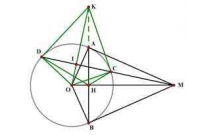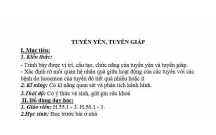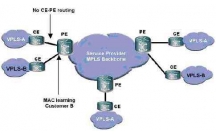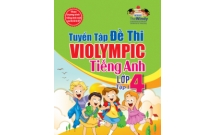
Tuyển tập bộ đề thi vào cấp 3 môn tiếng Anh
ÔN THI TIẾNG ANH VÀO LỚP 10
ĐỀ SỐ 16
Câu I: Chọn phương án A, B, C hoặc D ứng với từ có phần gạch chân được phát âm
khác với các từ còn lại.
1. A. sometimes B. visit C. worship D. with
2. A. washed B. looked C. stopped D. played
3. A. three B. through C. month D. than
4. A. nation B. pollution C. question D. information
Câu II. Chọn chữ cái A, B, C hoặc D ứng với từ hoặc cụm từ thích hợp để hoàn thành
các câu sau.
1. Did your children enjoy__________ in the sea?
A. swam B. swim C. to swim D. swimming
2. You have read this article on the website, __________ ?
A. don’t you B. aren’t you C. haven’t you D. have you
3. The girl wishes she __________ inHuefor the festival next week.
A. can stay B. stay C. stays D. could stay
4. The final examination will be held __________ June 18th , 2013.
A. in B. on C. at D. from
5. The boy mended his shirt by __________.
A. himself B. his C. him D. his
6. If it __________, we will go to the movies.
A. didn’t rain B. doesn’t rain C. won’t rain D. isn’t rain
7. We’re good friends. We __________ each other since we were in primary school.
A. know B. have been known C. have known D. knew
8. We should __________ all the electric appliances when leaving our room.
A. turn off B. turning off C. turn on D. turning on
9. Let’s __________ somewhere for a drink.
A. went B. to go C. going D. go
10. He went on working __________ it started to rain.
A. though B. because C. but D. and
11. I couldn’t tell what time it was because the workmen had removed the __ of the clock.
A. pointers B. hands C. arms D. fingers
12. Hoa: I suggest going camping next Sunday.
Lan: __________.
A. That’s fine to say B. That’s a good idea
C. That’s a reason D. That’s a good trip
Câu III. Viết dạng đúng của động từ trong ngoặc để hoàn thành câu.
1. Minh (listen) _____________ to music at the moment
2. Would you mind if I (borrow) ______________ your dictionary?
3. I (not watch)_______________ the film “The TITANIC” last night.
4. It’s necessary (protect) _______________ forests.
1
5. You ever (talk) ____________ to a foreigner? – No, never.
Câu IV. Viết dạng đúng của từ trong ngoặc để hoàn chỉnh các câu sau.
1. The boy is very __________ of his success at school. (PRIDE)
2. The soccer players have played __________ (BEAUTIFUL)
3. We must learn about keeping the environment __________ (POLLUTE)
4. We are impressed by the __________ of the people in your town. (FRIENDLY)
5. Their ____________ is advertised on TV everyday. (PRODUCE)
Câu V. Hoàn chỉnh câu thứ hai sao cho không đổi nghĩa so với câu đã cho.
1. Nga said, “I am going to meet my sister in front of the bus-stop tomorrow”
Nga said to me that___________________________________________________
2. Ba is more intelligent than his brother.
Ba’s brother is not ___________________________________________________
3. They are going to build a new theater.
A new theater ______________________________________________________
4. I don’t have a map, so I can’t show you the way.
If_______________________________________________________________
5. Laura painted a picture, and it’s being shown in an exhibition
The picture________________________________________________________
ĐỀ SỐ 17
I. Choose the word or phrase (A, B, C, or D) that best completes
each sentence.
!
"
#$%
&'((
2
)
*$…
+
,(-.+
/0(-12
3$((
400101 012
(
$(
$ 5(
$1
2 ( (
(
#567 33)
II. Choose one suitable word to complete each of spaces in the
following passage.
( members, day, food, prepare, together, celebration, clean )
5-.89-:&;
(<0((:);
=:*;
5(
(:,;(:/;
-(-6
(
III. Give the suitable form of the words in brackets.
30(- ((
(:'$>5;
4(-
:'?8;
3
@(
:?.5?A;
5:>;
#90
:085AA'5;
IV. Rewrite the following sentences.
&-
BBBBBBBBBBBBBBBBBBBBBBBBBBBBBBBBBBBBBBBBBB
).-1 C
5BBBBBBBBBBBBBBBBBBBBBBBBBBBBBBBBBBBBBBBBBBBBBB
*(
%BBBBBBBBBBBBBBBBBBBBBBBBBBBBBBBBBBBBBBBBBBBBBBB
,
5CBBBBBBBBBBBBBBBBBBBBBBBBBBBBBBBBBBBBBBBBBBBBB
/8(
8 8’BBBBBBBBBBBBBBBBBBBBBBBBBBBBBBBBBBBB
3'
'BBBBBBBBBBBBBBBBBBBBBBBBBBBBBBBBBBBBBBBBBBBBBBBBBBB
#4'
0’BBBBBBBBBBBBBBBBBBBBBBBBBBBBBBBBBBBBBBBBBBBBBBBBBBB
ĐỀ SỐ 18
I. Choose the word whose underlined part is pronounced differently from the others.
1. A. watched B. finished C. lived D.worked
2. A. their B. month C. those D. they
3. A. got B. job C. hot D. show
4. A. takes B. dances C. hopes D. looks
4
II. Choose the best answer from the four options given to complete each sentence.
1. My son has learnt English………………….he was 7 years old.
A. for B. since C. in D. on
2. It is…………………………….. easy test that students could do.
A. such an B. enough C. so D. too
3. These houses............ 50 years ago.
A. are built B.built C. were built D. build
4. Hurry up or you'll be late …………………….. school.
A. on B. in C. to D. for
5. She ……………………….a letter when the telephone rang.
A. wrote B. was writing C. was written D. has written
6. People in Israel are going to celebrate their festival ……………. is called Passover.
A. whose B. who C. which D. where
7. Don't talk in class, …………………….?
A. do you B. don't you C. will you D. did you
8. She asked me if I………………………a laptop computer the following day.
A. buy B. will buy C. bought D. would buy
III. Givwe the correct form of the words in brackets.
1. This coffee is too.................................... to drink. (HEAT)
2. It is …………………… to eat too much sugar and fatty food. (HEALTH)
3. I spent my .............................. in the country. (CHILD)
4. He was punished for his …………………………. (LAZY).
5. They walked and talk ……….. on the way home. (HAPPY)
IV. Give the correct form of the verbs in brakets.
1. They (study)…………………….…..………. English for 10 years.
2. Would you mind (tell)…………..…….…………me where I can go to post the letter ?
3. Ba wishes he (be) ………..……………………. a good doctor in the future.
4. The water was too hot for me……………………………….. (drink).
5. His father (be) ……………….. to America many times.
6. They (get) …………..………. married next Sunday.
5
V. Complete the second sentence so that it has a similar meaning to the first one.
1. The exercise was so difficult that I could not do it.
It was ......................................................................................................
2. “Are you cooking now?” she asked me.
She asked ................................................................................................
3. We can solve this problem.
This problem.............................................................................................
4. They started playing tennis in 2003.
They have.................................................................................................
5. I last saw him two weeks ago.
I haven’t ………………………………………………………………..
VI. Make sentences from the words and phrases provided.
1. I / not / meet / my parents / since last Sunday.
................................................................................................................
2. He / say / he / be / back / following / day.
................................................................................................................
3. It / difficult / learn English / without / good dictionary.
………………………………………………………………………………………………………………..
4. This/ be / best / movie / I / ever / see.
…………………………………………………………………………………………………………………..
VII. Read the passage and answer the following questions. (2pts)
Alexander Fleming was born in 1881 inScotland. He went to a small school in a
village, and when he left school he didn’t go to university. He worked for five years in an
office. But his brother, Tom, was a doctor and helped Fleming to go to university and
study medicine. So he went toLondonUniversityand in 1906 he became a doctor. In 1915,
Fleming married Sarah McElroy, an Irish woman. They had one son. During the First
World War, many soldiers died in hospital because they didn’t have the right medicines.
So after the war, Fleming tried to find a drug that could help them. He worked for many
years and in 1928 he discovered a new drug and he called it “penicillin”. He later worked
with an Australian and a German scientist to develop a drug that doctors could use. In
1945, they won the Nobel Prize in medicine for their work on penicillin.
1. Was Alexander Fleming born in 1871? …………………..…………………………
2. When did Alexander Fleming become a doctor?
6
có thể bạn quan tâm

Chuyên đề bồi dưỡng học sinh giỏi Hình học 9 - Chùm bài tập về tiếp tu...
11
3.002
525
Tài liệu, đề thi môn Toán
11
(New)

SINH HỌC : Cấu tạo, chức năng của tuyến yên và tuyến giáp
3
1.235
378
Giáo án, bài giảng lớp 8
3
(New)

Định tuyến và gán bước sóng trong mạng WDM và thực hiện mô phỏng định...
82
995
476
Kỹ thuật
82
(New)

Tuyển tập đề thi Violympic (IOE) tiếng anh lớp 4 tập 1
173
1.096
234
Tiếng Anh trẻ em
173
(New)

Tuyển tập 10 đề thi chuyển cấp môn tiếng Anh
29
574
284
Tiếng Anh phổ thông
29
(New)

Nghiên cứu thiết lập một website về đào tạo trực tuyến và thi trắc ngh...
58
1.303
431
Kỹ thuật
58
(New)

Tuyển tập giữa học kì 1 môn Tiếng Việt lớp 3
49
795
339
Tài liệu, đề thi môn Ngữ Văn
49
(New)

Lớp 7 - Tuyển chọn học sinh giỏi môn tiếng Anh lần 1
21
2.125
427
Tiếng Anh phổ thông
21
(New)
thông tin tài liệu
Tuyển tập bộ đề thi vào cấp 3 môn tiếng Anh
VII. Read the passage and answer the following questions. (2pts)
Alexander Fleming was born in 1881 inScotland. He went to a small school in a village, and when he left school he didn’t go to university. He worked for five years in an office. But his brother, Tom, was a doctor and helped Fleming to go to university and study medicine. So he went toLondonUniversityand in 1906 he became a doctor. In 1915, Fleming married Sarah McElroy, an Irish woman. They had one son. During the First World War, many soldiers died in hospital because they didn’t have the right medicines. So after the war, Fleming tried to find a drug that could help them. He worked for many years and in 1928 he discovered a new drug and he called it “penicillin”. He later worked with an Australian and a German scientist to develop a drug that doctors could use. In 1945, they won the Nobel Prize in medicine for their work on penicillin.
1. Was Alexander Fleming born in 1871? …………………..…………………………
2. When did Alexander Fleming become a doctor?
Mở rộng để xem thêm
từ khóa liên quan
tài liệu mới trong mục này
tài liệu hot trong mục này
tài liệu giúp tôi
Nếu bạn không tìm thấy tài liệu mình cần có thể gửi yêu cầu ở đây để chúng tôi tìm giúp bạn!
xem nhiều trong tuần
Đề thi và lời giải môn xác suất thống kê của trường Học viện ngân hàng
Địa lý 12 Phát triển cây công nghiệp lâu năm Tây Nguyên
Giáo trình Quản trị học của Đại học kinh tế quốc dân
MẪU GIẤY THI A4
Đề thi trắc nghiệm môn quản trị ngân hàng có đáp án
Sinh học 11 MỘT SỐ BIỆN PHÁP ĐIỀU KHIỂN SỰ SINH TRƯỞNG VÀ PT Ở ĐỘNG VẬT VÀ NGƯỜI (P2)
yêu cầu tài liệu
Giúp bạn tìm tài liệu chưa có
×



